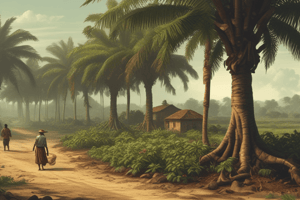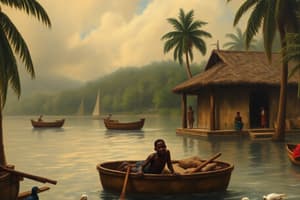Podcast
Questions and Answers
What was the main focus of the trade unions emerging in the Caribbean during the early twentieth century?
What was the main focus of the trade unions emerging in the Caribbean during the early twentieth century?
- Improving working conditions and job security (correct)
- Establishing government oversight on businesses
- Promoting vocational training for workers
- Advocating for colonial independence
Which commission was established by the British Government in 1938 to investigate social conditions in the Caribbean?
Which commission was established by the British Government in 1938 to investigate social conditions in the Caribbean?
- Social Welfare Tribunal
- Labour Relations Commission
- Colonial Inquiry Committee
- Royal Commission (Moyne) (correct)
What significant outcome resulted from the labour rebellions of the 1930s in the Caribbean?
What significant outcome resulted from the labour rebellions of the 1930s in the Caribbean?
- Introduction of new agricultural policies
- Establishment of exclusive trade companies
- Formation of a unified Caribbean government
- Creation of trade unions and political parties (correct)
Which of the following was NOT a recommendation of the Moyne Commission?
Which of the following was NOT a recommendation of the Moyne Commission?
Who among the following was a notable leader in the Caribbean trade union movement?
Who among the following was a notable leader in the Caribbean trade union movement?
What does political enfranchisement primarily involve?
What does political enfranchisement primarily involve?
What was one of the goals of the independence movement in Caribbean societies?
What was one of the goals of the independence movement in Caribbean societies?
Which of the following groups was excluded from political participation during the mid-20th century?
Which of the following groups was excluded from political participation during the mid-20th century?
What did the abolition of slavery in British colonies in 1834 fail to achieve?
What did the abolition of slavery in British colonies in 1834 fail to achieve?
What economic activity did Caribbean nationals frequently engage in after emancipation?
What economic activity did Caribbean nationals frequently engage in after emancipation?
What does trade unionism promote?
What does trade unionism promote?
What was a significant demand of Caribbean societies during their struggle for enfranchisement?
What was a significant demand of Caribbean societies during their struggle for enfranchisement?
Which of the following was NOT a characteristic of post-emancipation Caribbean society?
Which of the following was NOT a characteristic of post-emancipation Caribbean society?
What was the primary sentiment among Caribbean people following Emancipation and towards the end of the nineteenth century?
What was the primary sentiment among Caribbean people following Emancipation and towards the end of the nineteenth century?
Which of the following best describes universal adult suffrage?
Which of the following best describes universal adult suffrage?
In what year did Jamaica implement universal adult suffrage?
In what year did Jamaica implement universal adult suffrage?
What was one of the factors that influenced the shift toward universal adult suffrage in the Caribbean during the 1930s?
What was one of the factors that influenced the shift toward universal adult suffrage in the Caribbean during the 1930s?
Which political ideology emphasizes self-determination and independence from colonial rule?
Which political ideology emphasizes self-determination and independence from colonial rule?
Which of the following was NOT a factor that influenced the development of nationalism in the Caribbean?
Which of the following was NOT a factor that influenced the development of nationalism in the Caribbean?
What was one of the major outcomes of implementing universal adult suffrage?
What was one of the major outcomes of implementing universal adult suffrage?
How did nationalism contribute to the demand for suffrage in the Caribbean?
How did nationalism contribute to the demand for suffrage in the Caribbean?
What ideology emphasizes self-determination and civil rights for people of African descent?
What ideology emphasizes self-determination and civil rights for people of African descent?
Which movement aims to unify people of African descent globally?
Which movement aims to unify people of African descent globally?
How did the Negritude movement contribute to the fight for suffrage?
How did the Negritude movement contribute to the fight for suffrage?
What was a key goal of nationalist leaders in relation to the local population?
What was a key goal of nationalist leaders in relation to the local population?
Which ideology inspired Caribbean individuals to seek political empowerment and the right to vote?
Which ideology inspired Caribbean individuals to seek political empowerment and the right to vote?
What significant role did Pan-Africanism play in the suffrage movement?
What significant role did Pan-Africanism play in the suffrage movement?
What aspect of Garveyism motivated individuals to fight for voting rights?
What aspect of Garveyism motivated individuals to fight for voting rights?
In what year was the Negritude movement primarily developed?
In what year was the Negritude movement primarily developed?
Flashcards
Political Enfranchisement
Political Enfranchisement
Granting people the right to participate in the political system, usually through voting and holding office.
Adult Suffrage
Adult Suffrage
The right to vote for all adults, regardless of gender or race.
Trade Unionism
Trade Unionism
Workers forming organizations (unions) to improve their working conditions and rights.
Post-Emancipation Period
Post-Emancipation Period
Signup and view all the flashcards
Colonial Oppression
Colonial Oppression
Signup and view all the flashcards
Independence Movement
Independence Movement
Signup and view all the flashcards
Abolition of Slavery
Abolition of Slavery
Signup and view all the flashcards
Disenfranchisement
Disenfranchisement
Signup and view all the flashcards
Trade Unionism in the Caribbean (early 20th century)
Trade Unionism in the Caribbean (early 20th century)
Signup and view all the flashcards
Moyne Commission (1938)
Moyne Commission (1938)
Signup and view all the flashcards
Labour rebellions (1930s Caribbean)
Labour rebellions (1930s Caribbean)
Signup and view all the flashcards
Trade unions and political parties (1930s Caribbean)
Trade unions and political parties (1930s Caribbean)
Signup and view all the flashcards
Charismatic labor leaders
Charismatic labor leaders
Signup and view all the flashcards
Universal Adult Suffrage
Universal Adult Suffrage
Signup and view all the flashcards
Nationalism (in the Caribbean)
Nationalism (in the Caribbean)
Signup and view all the flashcards
Elected Representation
Elected Representation
Signup and view all the flashcards
Jamaica's Suffrage Implementation
Jamaica's Suffrage Implementation
Signup and view all the flashcards
Colonial Legislatures
Colonial Legislatures
Signup and view all the flashcards
Disagreements in Colonial Assemblies
Disagreements in Colonial Assemblies
Signup and view all the flashcards
Factors Influencing Suffrage
Factors Influencing Suffrage
Signup and view all the flashcards
Nationalist Leaders' Goal
Nationalist Leaders' Goal
Signup and view all the flashcards
Garveyism's Impact
Garveyism's Impact
Signup and view all the flashcards
Pan-Africanism's Influence
Pan-Africanism's Influence
Signup and view all the flashcards
Negritude's Role
Negritude's Role
Signup and view all the flashcards
Garvey's Main Advocacy
Garvey's Main Advocacy
Signup and view all the flashcards
Pan-Africanism: Global Unity
Pan-Africanism: Global Unity
Signup and view all the flashcards
Negritude's Essence
Negritude's Essence
Signup and view all the flashcards
Shared Goal: Suffrage
Shared Goal: Suffrage
Signup and view all the flashcards
Study Notes
Political Enfranchisement
- Political enfranchisement is the process of granting individuals or groups the right to participate in a political system, primarily through voting and holding public office.
- During the mid-20th century, many black people were excluded from political participation.
- Colonial societies often oppressed Black people after emancipation.
- Various experiences promoted political enfranchisement ideas.
- The abolition of slavery in 1834 in British colonies did not lead to meaningful social, economic, or political change for ex-slaves.
- Many ex-slaves migrated for better wages, working in various industries like the Panama Canal and sugar industries.
Goals
- The goal was for greater freedom, which included better treatment and better wages.
- Thousands of Caribbean people migrated to different regions seeking better wages and employment after emancipation.
Enfranchisement
- The struggle for political enfranchisement was a key aspect of the independence movement.
- Many Caribbean societies aimed to expand voting rights to a wider segment of the population, abandoning discriminatory practices against certain classes and races.
- Campaigning for universal adult suffrage (right to vote for all adults) was a response to systemic disenfranchisement among Caribbean citizens under colonial rule.
Trade Unionism
- Trade unionism is a practice where workers unite to form trade unions.
- The unions represent workers' interests, advocating for better working conditions, fair wages, and job security.
- This practice involves collective bargaining, where union representatives negotiate with employers to achieve favorable agreements affecting workers' rights and working lives.
Methodology
- Severe material deprivation and poverty were prevalent among the working population in the early 20th century.
- Labour rebellions, strikes, and widespread protests were common across British Caribbean colonies.
- The British government created the Royal Commission (Moyne) in 1938 to investigate social conditions.
- The Moyne Commission's findings were alarming, highlighting social inequalities.
- The commission suggested reforms, including a wider voting franchise and lower candidate qualifications.
- A colonial fund was recommended to address the needs of the colonial working class.
Result
- The social rebellions of the 1930s led to the formation of trade unions and the emergence of political parties.
- These entities represented the working class, focusing on better working conditions, health improvements, and education.
Analysis
- The 1930s saw the rise of charismatic labor leaders, like Uriah Buzz Butler, Adrian Cola Rienzi, A.A. Cipriani, Alexander Bustamante, Norman Washington Manley, Grantley Adams, and Nathaniel Crichlow.
- These leaders organized and developed the Caribbean trade union movement.
Political Development
- After emancipation, in the late 19th century, many Caribbean people sought independence from their colonizers and an end to oppression.
- Colonists sought a greater say in their colony's governance.
- Colonial legislative assemblies often clashed with governors and government bodies.
Universal Adult Suffrage
- Universal adult suffrage grants voting rights to all citizens, regardless of race, gender, or social class (except for age).
- Voting age was initially 21, but later lowered to 18.
- The widespread unrest of the 1930s forced colonial governments to introduce elected representation in many colonies.
- The right to vote regardless of race, sex, belief, sexual orientation, gender identity, wealth, social status or disability was established.
Analysis (Factors influencing Enfranchisement)
- Nationalism, Garveyism, Pan-Africanism, Negritude and trade unionism influenced the movement for enfranchisement.
Garveyism
- Marcus Garvey, a Jamaican political leader, promoted black pride, economic independence, and the return to Africa for people of African descent.
- Garveyism inspired many Caribbean people to embrace their heritage and seek political empowerment fighting for civil rights.
Pan-Africanism
- Pan-Africanism urged unity and upliftment of African peoples globally, encouraging solidarity among African nations.
- This movement supported Caribbean peoples' fight for rights and recognition.
Negritude
- Negritude was a literary and cultural movement that celebrated Black culture, identity, and values while rejecting colonialism.
- Negritude encouraged pride in African heritage and identity, influencing individuals to demand equal rights.
Studying That Suits You
Use AI to generate personalized quizzes and flashcards to suit your learning preferences.





